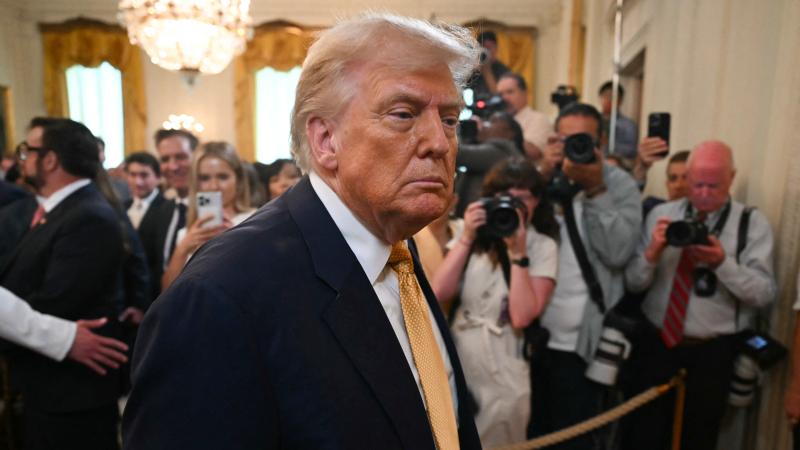Critics say N.M. solar company's struggles are a ‘poster child’ for Inflation Reduction Act's harm
Maxeon is applying for a Department of Energy loan, but its financial struggles are a reminder of Solyndra, a solar company that received $535 million in loans that were co-signed by the Obama administration. It went bankrupt two years later.
On her campaign site, Vice-President Kamala Harris provides less than 200 words on her plans for the country’s energy policy if she wins the election. While providing no specifics, Harris boasts of her tie-breaking vote on the Inflation Reduction Act, which she calls the “largest investment in climate action in history,” and promises to create “hundreds of high-quality clean energy jobs.”
Together with the Bipartisan Infrastructure Law, the Biden-Harris administration is pouring billions into a “new industrial revolution in clean energy.” Among the hundreds of private-sector investments that are bolstered by taxpayer support from the two laws is a Singapore-based solar energy company Maxeon. The company announced in August 2023 that it was locating a 3-gigawatt solar panel manufacturing facility in Albuquerque, New Mexico.
Maxeon was a vocal advocate for the passage of the Inflation Reduction Act.
“As a solar industry technology leader with a legacy of over 35 years' experience in the U.S. market, Maxeon believes the proposed measures will catalyze significant investment in U.S. solar manufacturing, facilitate the creation of a stable domestic solar supply chain, and allow the U.S. to aggressively pursue the decarbonization of its economy with less reliance on imported solar products,” Jeff Waters, then-CEO of Maxeon, said in a 2022 statement.
Today, the company is drowning in financial problems, and its stock price has collapsed. When it announced its first quarter 2024 financial results, the company said TCL Zhonghuan, a Chinese green-energy investor, was going to invest over $197 million to help the company's financing.
“This is the biggest poster child for the inflation Reduction Act,” Larry Behrens, director of communications for Power the Future, a energy-worker advocacy group, told Just the News.
Maxeon is applying for a Department of Energy loan, and the facility is, according to company announcements, dependent on that loan. The situation shows parallels to Solyndra, a solar company that received $535 million in loans that were co-signed by the Obama administration. Two years later, the company filed for bankruptcy, and investigations showed the company leadership engaged in a pattern of Solyndra’s leaders engaged in a pattern of misleading claims, resulting in millions of taxpayer dollars lost.
State and local support
As with other communities tapping into federal funding for green manufacturing, New Mexico showered Maxeon with an incentive package in order to attract the company. According to left-leaning New Mexico In Depth, the package included local economic development funding, gross receipts tax rebates for construction, and $2.4 billion in industrial revenue bonds. Citing figures from the state’s economic development secretary, Maxeon stands to receive $600 million in discounts for locating in New Mexico. Ninety percent of the state and local funding is conditioned on the company reaching certain thresholds, including hiring a certain number of workers and construction milestones.
The incentives proved successful, and Maxeon’s decision to locate this massive solar facility in Albuquerque received great fanfare from New Mexico’s Democrats. The company planned to begin construction in the first quarter of 2024 on a 160-acre site. It would, according to an announcement from New Mexico Gov. Michelle Lujan Grisham, provide 1,800 jobs and be the largest solar manufacturing facility in the U.S.
“Maxeon is going to keep moving us, and the United States, forward in solar and renewable energy manufacturing. It takes everyone growing together. I am incredibly proud to welcome Maxeon to New Mexico,” Grisham said in a statement.
New Mexico Sen. Ben Ray Lujan and Rep. Melanie Stansbury, both Democrats, also praised the jobs the facility would bring, as well as its contribution to a theoretical transition away from fossil fuels.
The company will also benefit from federal tax credits, the Washington Beacon reports, which allow manufacturers to write off 30% of investment costs in facilities and equipment, or they can receive federal funds for some of the components in the products the company manufactures.
Decline
With Maxeon’s latest financial reports, there’s a growing uncertainty in the company’s ability to deliver on its promises. The company posted a nearly $39 million loss in the first quarter of the fiscal year. Its stock price fell over 99% in the past year.
A spokesperson for Maxeon told New Mexico In Depth that it wouldn’t be breaking ground on construction until the fourth quarter of this year, with production starting in 2026.
Less than two weeks before the earnings announcement, Maxeon announced it had received a notice of noncompliance from Nasdaq for failing to file on time its annual report for the year ending Dec. 31, 2023. Before the end of May, the company announced it was back in compliance.
In its earnings announcement, the company said that its largest shareholder, China-based TCL Zhonghuan Renewable Energy Technology Co. Ltd., was investing $200 million, which would give the Chinese company majority control.
The Inflation Reduction Act was intended to spur American manufacturing, but according to the New York Times, the law doesn’t exclude foreign companies from receiving tax credits for investing in clean energy industrial facilities. Sen. Marco Rubio, R-Fla., introduced a bill last year to block China from receiving the credits. The bill has yet to be heard on the Senate floor.
The Department of Energy wouldn't answer questions about how the change in majority control to a Chinese firm could impact loan eligibility, nor would it confirm or deny any applicant.
“Let's imagine it all goes swimmingly. It goes the way that the governor, Biden, and Harris wants to go. They break ground, start producing, full production, all the employees, everything. Where do the profits go? Are we doing profits for a Chinese company now, taxpayer dollars for a Chinese company?” Behrens said.
He said it’s also problematic for unprofitable green-energy companies like Maxeon to receive such extensive federal, state and local support, while New Mexico looks to burden the oil and gas industry, which generates billions in revenues for the state, with more regulations.
“So while the governor and the Harris administration are looking to throw hundreds of millions of dollars at this company that can’t stand on its own two feet, here in New Mexico, we have the largest industry in the state putting billions into state coffers. New Mexico has the biggest budget it’s ever had in its history, all because of oil and natural gas workers. And that is the exact industry that Kamala Harris and Gov. Grisham are trying to kill,” Behrens said.
The DOE’s interactive map of green manufacturing projects supported by the Inflation Reduction Act and Bipartisan Infrastructure Law shows hundreds of planned facilities across the country. Five of those are in New Mexico, but not all of them are listed.
In August, Grisham announced that Ebon Solar is planning a $942 million investment in the same location as Maxeon’s planned facility.
Maxeon didn’t respond to requests to comment on this story.
The Facts Inside Our Reporter's Notebook
Links
- less than 200 words
- new industrial revolution in clean energy
- announced in August 2023
- said in a 2022 statement
- company said
- TCL Zhonghuan
- Power the Future
- according to company announcements
- investigations showed
- resulting in millions of taxpayer dollars lost
- communities tapping into federal funding
- According to left-leaning New Mexico In Depth
- according to an announcement
- Washington Beacon reports
- posted a nearly $39 million loss
- fell over 99% in the past year
- told New Mexico In Depth
- Maxeon announced
- announced it was back in compliance
- according to the New York Times
- introduced a bill
- yet to be heard
- putting billions into state coffers
- interactive map of green manufacturing projects
- Grisham announced
















